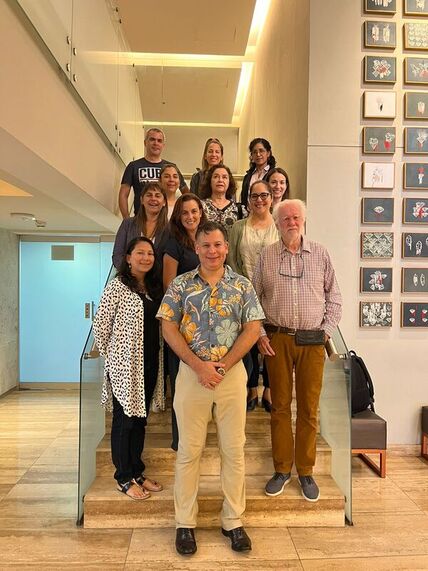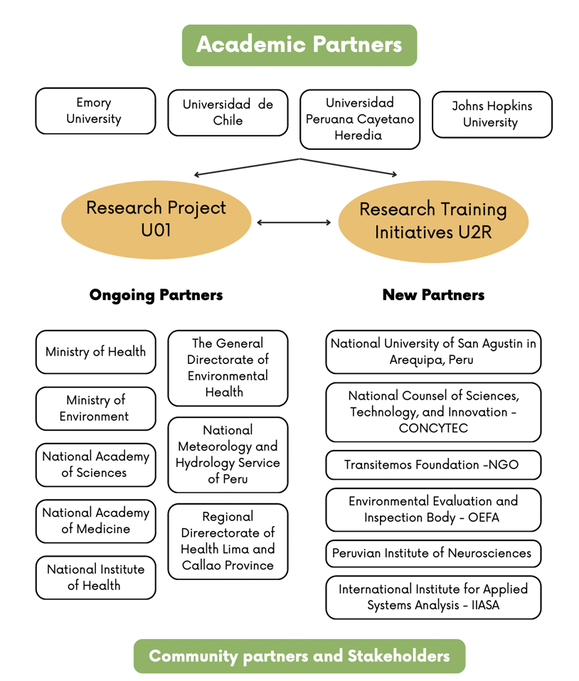Stella Hartinger
Centro Latinoamericano de Excelencia en Cambio Climático y Salud
Universidad Peruana Cayetano Heredia
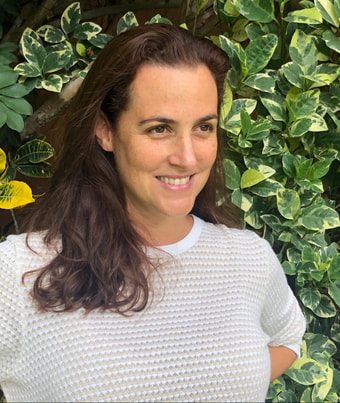
Stella M. Hartinger, MSc, PhD is Director of the Lancet Countdown Regional Center in South America, the Latin American Center of Excellence in Climate Change and Health (CLIMA) and the Integrated Development, Health and Environment Unit at the Public Health School at Cayetano Heredia University, Lima, Peru. Her current experience in research studies combines projects in community health in Andean populations, randomized control trails, follow-up of large cohorts, large series statistical data analysis and the coordination of several environmental impact assessment studies (EIA), baseline studies and animal and human health studies in different region of the country.
Her main interests are threefold: Delivering health interventions addressing environmental health problems, creating supportive environments for disease prevention and maintaining health and wellbeing. Current focus is on childhood related illnesses such as pneumonia, diarrhea, malnutrition, and early child development; Assessing environmental factors that potentially address both, the health of the environment but also environmental human health. Dr. Hartinger is one of the co-PIs on recently renewed GEOHealth Hub.
Stella M. Hartinger, MSc, PhD is Director of the Lancet Countdown Regional Center in South America, the Latin American Center of Excellence in Climate Change and Health (CLIMA) and the Integrated Development, Health and Environment Unit at the Public Health School at Cayetano Heredia University, Lima, Peru. Her current experience in research studies combines projects in community health in Andean populations, randomized control trails, follow-up of large cohorts, large series statistical data analysis and the coordination of several environmental impact assessment studies (EIA), baseline studies and animal and human health studies in different region of the country.
Her main interests are threefold: Delivering health interventions addressing environmental health problems, creating supportive environments for disease prevention and maintaining health and wellbeing. Current focus is on childhood related illnesses such as pneumonia, diarrhea, malnutrition, and early child development; Assessing environmental factors that potentially address both, the health of the environment but also environmental human health. Dr. Hartinger is one of the co-PIs on recently renewed GEOHealth Hub.
Gustavo Gonzalez
Facultad de Ciencias y Filosofia
Universidad Peruana Cayetano Heredia
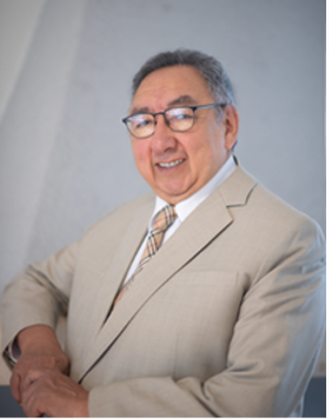
Gustavo F. Gonzales, M.Sc, MD, PhD, is professor of the Department of Biological and Physiological Sciences and director of the Laboratory of Endocrinology and Reproduction of the Faculty of Sciences and Philosophy of the Universidad Peruana Cayetano Heredia (UPCH). He has a Master of Science with mention in Physiology, specialty in endocrinology, Doctorate in Science with mention in physiology and Doctorate in Medicine. He has been the Director of the High-Altitude Research Institute and the Vice dean (1999-2002; 2002-2005), Dean of the Faculty of Sciences and Philosophy (2005-2008), and President of the UPCH (2021). He was President of the National Academy of Sciences (2018-2021) and is now the Vice President of the National Academy of Medicine (2021-2023). Since 2014, Dr. Gonzales has been one of the Principal Investigators of the GEOhealth Hub centered in Peru. He is the author of 390 publications, including15 books and 26 book chapters with and h-index of 58 as cited by Google Index. He has received 78 distinctions between national and international during his scientific career. In July 2022 he was recognized as Distinguished investigator by the National Council of Science, Technology, and Innovation (CONCYTEC).
William Neville Checkley
School of Medicine
Johns Hopkins University
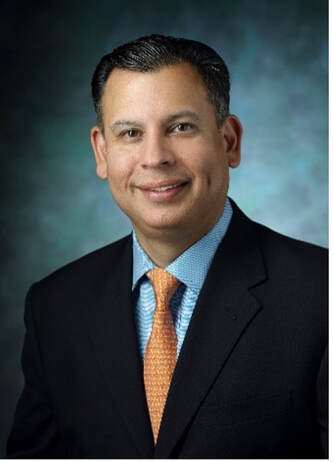
William Checkley, MD, PhD is an Associate Professor of Medicine in the Division of Pulmonary and Critical Care at the Johns Hopkins School of Medicine and hold joint appointments in International Health and Biostatistics at the Johns Hopkins Bloomberg School of Public Health. His research has focused on observational studies and randomized controlled trials to combat non-communicable diseases in resource-limited settings in low- and middle-income countries, with a focus on air pollution as an environmental risk factor. Dr. Checkley is Principal Investigator the NHLBI-funded trials including the Household Air Pollution Intervention Network (HAPIN) trial and Late-Stage Implementation Research Addressing Hypertension in Low- and Middle-Income Countries: Scaling Up Proven-Effective Interventions. He is strongly committed to non-communicable disease research and clinical research training, with 326 publications in peer-reviewed journal as cited by PubMed and an h-index of 63 as cited by Google Index. Finally, Dr. Checkley is the Director for the UMJT Fogarty Global Health Fellowship at Johns Hopkins University and has mentored >100 U.S. and international trainees. Recent recognitions include the World Lung Health Award of the American Thoracic Society (2021) and he is an elected member of the American Society for Clinical Investigation (2022).
Kyle Steenland
Rollins School of Public Health
Emory University
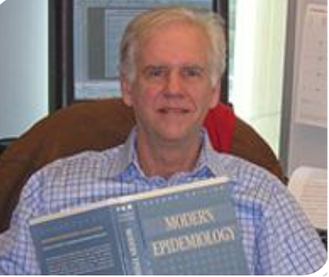
Kyle Steenland is a PhD epidemiologist and Masters-level statistician who has worked at Emory’s Rollins School of Public Health, Dept. of Environmental Health since 2002. Prior to that Dr. Steenland worked at CDC/NIOSH for 20 years. He has published over 125 first-authored articles regarding both occupational/environmental health. Dr. Steenland is a co-investigator in the Emory led HAPIN trial (hapintrial.org), which is a randomized trial of gas cookstoves in 4 countries with 3200 participants. As part of HAPIN he is leading a project on the association of household air pollution with the presence of COVID antibodies. He has worked extensively on PFOA studies in the mid-Ohio valley. He has also worked on a variety of research projects in Peru in the previous 5-year GeoHealth Hub cycle (geohealthperu.org). Dr. Steenland has a particular interest in methodological/statistical issues in epidemiology, including adjustment for confounding, measurement error, empirical Bayes adjustments, counter-matching, biases in attributable risk, risk assessment, and attenuation of effect measures at high exposure, among others
Paulina Pino
Escuela de Salud Publica
Universidad de Chile
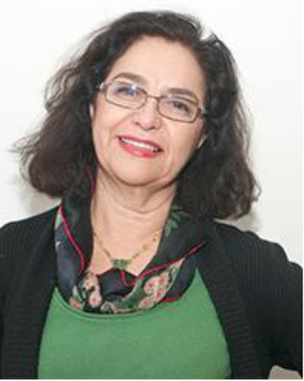
Paulina Pino, PhD, has training and experience in nutritional epidemiology and is a Professor at the Epidemiology Program at the Universidad de Chile. Dr. Pino has worked in Chile, Peru, Guatemala, and Brazil. In Chile, she has developed the area of environmental epidemiology, especially heavy metals, air pollution and its impact on respiratory health in infants and schoolchildren. Dr. Pino has directed national and international projects on the effects of specific pollutants -particles, lead, arsenic, nickel, industrial emissions- in homes, schools, and the community environment.
Between 2003 and 2013, Dr. Pino directed the launching and conducting of the first Doctorate program in Public Health in Chile. She also directed two projects for the development of human resources for research (MECESUP) and collaborated with Emory University in the training activities for the GEOHealth Hub sponsored by FIC/NIH, which have made possible to create a center for excellence in research training in South America. Her areas of interest are in environmental epidemiology, nutritional epidemiology, and graduate education in public health. Dr. Pino is the research training program director for the GEOHealth Hub.
Paulina Pino, PhD, has training and experience in nutritional epidemiology and is a Professor at the Epidemiology Program at the Universidad de Chile. Dr. Pino has worked in Chile, Peru, Guatemala, and Brazil. In Chile, she has developed the area of environmental epidemiology, especially heavy metals, air pollution and its impact on respiratory health in infants and schoolchildren. Dr. Pino has directed national and international projects on the effects of specific pollutants -particles, lead, arsenic, nickel, industrial emissions- in homes, schools, and the community environment.
Between 2003 and 2013, Dr. Pino directed the launching and conducting of the first Doctorate program in Public Health in Chile. She also directed two projects for the development of human resources for research (MECESUP) and collaborated with Emory University in the training activities for the GEOHealth Hub sponsored by FIC/NIH, which have made possible to create a center for excellence in research training in South America. Her areas of interest are in environmental epidemiology, nutritional epidemiology, and graduate education in public health. Dr. Pino is the research training program director for the GEOHealth Hub.
Our Project Partners
Our Funding Partners
National Institutes of Health (NIH)
Fogarty International Center (FIC)
National Institute of Aging
National Institute of Environmental Health Sciences (NIEHS)
National Institute for Occupational Safety and Health (NIOSH)
Fogarty International Center (FIC)
National Institute of Aging
National Institute of Environmental Health Sciences (NIEHS)
National Institute for Occupational Safety and Health (NIOSH)
External Advisory Committee
Jonathan Samet
Dean of the Colorado School of Public Health, USA
Website
Laura Klener Gallardo
Professor at the Geophysics Department (DGF), University of Chile and founding director for the Center of Excellence for Climate and Resilience Research (CR2), Chile
Website
Carmen Gastanaga
Peruvian Ministry of the Environment (MINAM), Peru
Website
Dean of the Colorado School of Public Health, USA
Website
Laura Klener Gallardo
Professor at the Geophysics Department (DGF), University of Chile and founding director for the Center of Excellence for Climate and Resilience Research (CR2), Chile
Website
Carmen Gastanaga
Peruvian Ministry of the Environment (MINAM), Peru
Website
Contact Us
If you would like more information about the activities of the GEOHealth hub centered in Perú,
